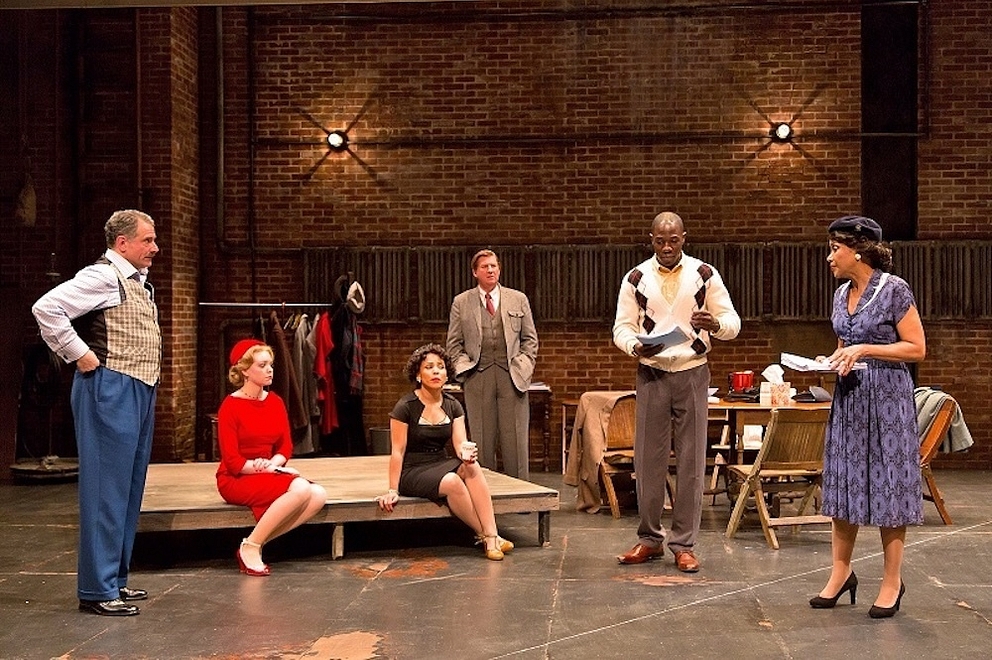Raleigh/ Durham/ Chapel Hill
When It’s Time To Take A Stand
by | Apr 3, 2024 4:40 pm
Post a Comment | E-mail the Author
Posted to: Theater

Trouble In Mind
Raleigh Little Theatre
March 30, 2024
“Don’t think!” the director yelled, stomping over the actress’ rebuttals.
That was part of a pivotal scene in Trouble in Mind. It’s a play within a play, set in the 1950s during rehearsals for a Broadway show about lynching.
The charter of the actress, Wiletta, is an African American woman who’s been cast as the leading lady for the first time in her career by Al Manners, a white director whom she’s worked with before. Wiletta is fighting to have either the script or the plot of play changed to reflect a more thoughtful and logical ending. But every time Wiletta tries to get past a “but or an “I only thought,” Al cuts off her every word, eventually forcing her quiet. The repeated shutdowns and dismissals reveal the overarching theme of the show, racism in the arts.
A staging of the play took place at the Gaddy-Goodwin Teaching Theatre in western Raleigh Saturday night. It’s one of the three venues owned by Raleigh Little Theatre, a community-based company that first opened its doors in 1936.
Front-row audience members sat just feet away from the stage, on which stood a wooden table, chairs, benches, a coat rack, and an archway entry. The lights dimmed, old-timey music played, and the actors took their places, entering from both stages left and right.
Attendees watch as Wiletta struggles to accept the plot and debates whether to speak up for herself or just be glad she finally has the job she’d dreamed of for 25 years. In the play, she plays the mother of the boy the lynch mob is after, and wants to change the way his parents are perceived. They are designed in a light similar to the “mammy” caricature, with Al, the director, advising them to exaggerate their actions and say words like “fickin.” Their son expresses his excitement about having the right to vote, but it stirs up trouble in the town, and a mob forms in response. What Wiletta can’t comprehend was why the parents convince their son to turn himself in for a crime that hasn’t even been fully defined. The mob eventually kills the boy.
While at work, she typically puts on a smile, laughs at unfunny jokes, and doesn’t argue with those in charge. Her castmates agree she should continue to do this. But her feelings about the script continue to pick at her soul, especially after one her castmates, Sheldon Forrester, describes the horror and heartbreak of seeing a lynching as a little boy.
Wiletta eventually reaches her boiling point and explodes during a rehearsal. She calls Al racist and takes aim at the lack of sense in the script and how it pushes the idea of the “white savior,” at his failure to see how the characters’ mannerisms, decisions, and actions are rooted in racial stereotypes.
Al’s response is essentially: Be thankful he’s even doing it, because not many directors are casting Black actors in plays.
He explains that if he were to comply, the show would lose funding. He says the American people aren’t ready for the changes she’s demanding. Going against the grain wasn’t something he was prepared to do; he thought he was doing enough. Despite how detrimental it may be, he’s telling her, “That’s how things are; deal with it.” It’s a sentiment echoed by her fellow castmates, but from them, it comes from a place of survival.
Being forced to accept things just to afford food, clothing and shelter isn’t enough, and isn’t something Wiletta believes she needs to accept any longer.
It’s well documented that media have played a significant role into how Black people are perceived in this country. It contributes to the unconscious biases that partly guided public policy, which has affected everything from schooling, to infrastructure and food access.
Challenging the way Black people were being depicted in all forms of media, music, and visual arts, was much bigger than the characters or play itself. But maybe that was playwright Alice Childress’s point, to go against the norm crafted by a painful and vicious history. Maybe her point was to go against the subsequent attempt to change that history at a time when stereotypes were integrated into all realms of storytelling. It shows how powerful those mediums can be. Fortifying the opposite can encourage people to demand a better livelihood and find their power and voice. It’s something many are afraid of because it causes rifts and waves in preconceived thoughts and beliefs, making the name of the play fitting. It shows the unease people feel when forced to look at their own actions, and how it can become such a difficult decision for those who may want to address them.
Humor was also infused into the play within a play, which often lightened the mood and highlighted the relationships Wiletta shared with her castmates, and even finds solace in the Irish Doorman, Henry.
The two-and-a-half-hour show concluded with a standing ovation from the audience. Trouble in Mind was presented by an arrangement with Concord Theatricals and is currently playing in local theaters New York, Missouri, and Florida. The next show at the Raleigh Little Theater is Looking for Roberto Clemente in May.